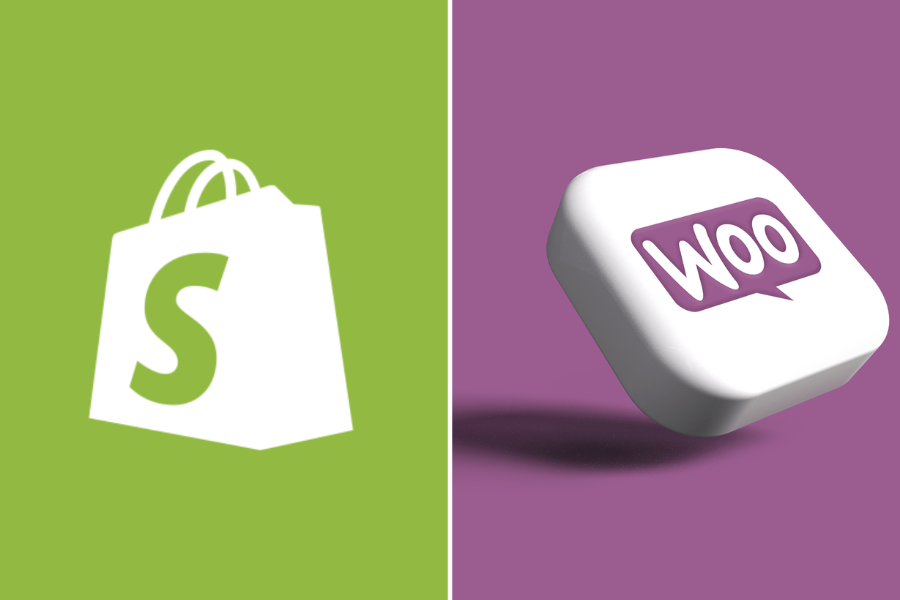Many aspects that a platform can provide can define the success of an online business in the rapidly growing community of the internet. Two examples of renowned players in this regard are Shopify and WooCommerce, as they have different key strengths, and cater for distinct business needs. This blog post will be comparing Shopify VS Woocommerce, and we’ll uncover the aspects that make Shopify a better choice for many business people.
What Are Shopify And Woocommerce?
Now before going straight to Shopify VS Woocommerce, let’s try to know these both. A fully hosted ecommerce platform which is called Shopify helps companies specifically to set up an online store without any necessity to possess expert technical knowledge. It provides all the basic and advanced facilities related to your store management like hosting and security to accept payments, and to manage the products in store.
On the other hand, WooCommerce is an open source plugin over WordPress which is the world’s most popular Content Management System. The software provides customers the means of turning their WordPress websites into fully functional Internet stores. It avails itself of the plugins and the themes which are residing inside the WordPress kingdom to give flexibility and options for customization.
Now let’s compare them.
Shopify VS Woocommerce: Which Is Better?
Security
In Shopify VS Woocommerce, Shopify offers network security, data backups, access management, and safe encryption so you can concentrate on the expansion of your business. Your teams’ personal responsibility for hosting, PCI compliance, and software updates when using open-source platforms like WooCommerce increases the risk of cybersecurity breaches.
Ease of Use
Users do not need to be technological experts to swiftly launch their stores using Shopify. The software helps in the running of an online store since it handles host services, security updates, and even backups. However, this flexibility is bought with the fact that it requires more effort and technical skills to implement WooCommerce stores. For individuals who are not experienced with website maintenance, users may find it intimidating to handle their own hosting, security protocols, and upgrades.
Better TCO
The total cost of ownership for Shopify is 36% better than that of WooCommerce. For companies trying to increase their operational efficiency, Shopify is the platform of choice because of its affordable platform costs, user-friendly interface, and simplicity. Since Shopify is a simpler platform and requires fewer developers than WooCommerce, its overall running costs are lower. However, WooCommerce needs a number of add-ons.
Performance
Between Shopify VS Woocommerce, Shopify guarantees dependable performance and expandability, even in times of increased traffic. The infrastructure of the platform is strong and offers quick loading speeds, specifically tailored for e-commerce. WooCommerce performance varies based on the hosting company and plugins that are used. Customers need to be sure that their hosting package can accommodate the needs of the store, particularly when traffic and sales volume rise.
Easy-Admin Management
The user-friendly interface of Shopify enables both business and technical users to create value on their own. On the other hand, WooCommerce necessitates the engagement of developers in order to build and update plugins and make numerous storefront adjustments. Shopify can function with “low code” without sacrificing the appearance of your store. Shopify may be operated by anyone on your team!
More Capabilities
When comparing Shopify vs Woocommerce, the former offers a comprehensive set of best-in-class commerce features that will help your company expand regardless of your goals. Shopify provides features like product setups, marketing tools, and sophisticated B2B. Some of them are:
Extensive App Selection
Shopify is a comprehensive solution for all your DTC, B2B and Point of Sale needs and is aimed at helping your organisation grow in every facet possible. There isn’t much control over which plugins are featured on WooCommerce, and there’s not much information available concerning maintenance. Shopify is committed to ensuring seamless integration and effortless updates.
Built-in Features
Shopify’s all-inclusive e-commerce platform for DTC, B2B, and Point of Sale (POS) is designed to support the expansion of your company in every manner. Semantic search, multicurrency and language management, free first-party marketing tools, and customizable data models are just a few of the features that offer best-in-class functionality to let your teams concentrate more on innovation and on starting from scratch.
Shopify VS Woocommerce: What To choose?
In Shopify VS Woocommerce Shopify wins the debate because:
Simplicity
Users with different degrees of technical ability may easily set up and manage an online store thanks to Shopify’s simplified method. Shopify which has a user-friendly feature helps your firm to be nimble and grow as a business by simply changing and creating alignments with trends.
Scalability
Shopify is designed to accommodate stores ranging from the new startup company to the large established company. Without sacrificing performance, the platform grows with organisations in a smooth and seamless manner.
Support and Resources
Shopify provides extensive documentation, round-the-clock customer service, and a thriving user and developer community. This ecosystem of support finds rapid fixes for problems and helps businesses improve their stores.
Integrated Ecosystem
Users of Shopify can access an extensive ecosystem of interfaces and apps that increase the capabilities of the platform. These interfaces enable organisations to streamline processes and spur expansion by providing them with everything from marketing tools to analytics and inventory control.
Think of Shopify as your successful partner if you’re prepared to advance your online business. With its user-friendly design, robust functionality, and dependable infrastructure, Shopify enables companies to succeed in the online market.
So upscale your business with Shopify today!
Conclusion
In conclusion, excellent possibilities for building online stores are provided by both WooCommerce and Shopify. In Shopify VS Woocommerce, Shopify is preferred by many businessmen due to the fact that it is an integrated solution that provides safety, extensibility, and simplicity. Shopify is the perfect choice no matter if you are running a first or second company or if you want to improve and streamline the existing one. It provides the help and tools necessary to succeed in the highly competitive world of Internet commerce. And, by choosing Shopify, companies can focus on what should be valued – customers’ satisfaction with goods and service while all the technical side will be provided by Shopify.
For more information visit Noblepuma.







